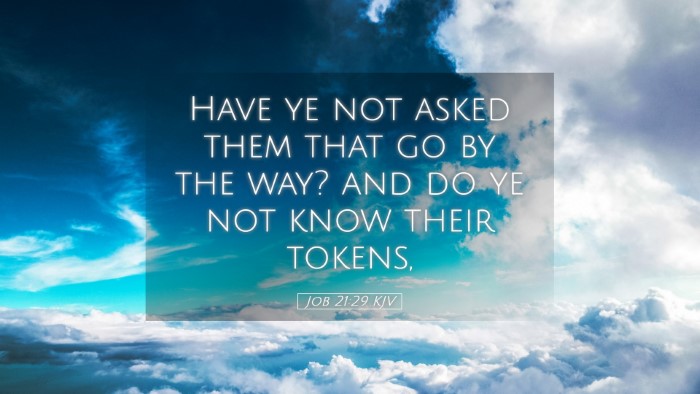Commentary on Job 21:29
Introduction
Job 21:29 states: “Have ye not asked them that go by the way? and do ye not know their tokens?” This verse presents an important inquiry into the nature of wisdom and understanding amidst suffering and injustice. Through careful examination of Job's plight and the responses from his friends, one can gain profound insights into the theological implications of righteous suffering. Below, the thoughts of noted biblical commentators are synthesized to provide depth to this verse for pastors, students, and scholars alike.
Contextual Understanding
In the context of the Book of Job, this passage appears as a part of Job's defense against the accusations of his friends who misinterpret his suffering as a consequence of sin. Job boldly challenges them to reconsider their preconceived notions of righteousness and the apparent prosperity of the wicked.
Matthew Henry highlights that Job is urging his friends and any observers to look beyond surface-level judgments. He emphasizes the importance of seeking wisdom from the experiences of those who witness the trials of life. Job's question implies that there are substantial truths discernible in the life and experience of others that can verify his claims about the fate of the wicked versus the righteous.
Exegesis of Key Phrases
“Have ye not asked them that go by the way?”
This phrase indicates that Job encourages his audience to learn from the experiences of others. Albert Barnes notes that travelers and passersby often carry reports and narratives that reveal the true nature of life's situations. Job emphasizes the need for reflective listening rather than dogmatic responses that his friends have offered.
“Do ye not know their tokens?”
Job's inquiry into the “tokens” alludes to various signs or proofs observable in life. Adam Clarke discusses how these “tokens” may refer to the observable results of justice and injustice in the world. This calls for a more profound understanding of divine justice, one that goes beyond the simplistic tit-for-tat theology that his friends espouse.
The Quest for Understanding
Job’s pursuit for answers is a central theme throughout his discourse. The challenge posed by Job in this verse resonates with a universal search for meaning in suffering. Matthew Henry remarks that Job's insistence on seeking knowledge from multiple perspectives underscores a vital lesson: knowledge is often multi-faceted and requires humility and diligence to obtain.
This call for inquiry serves as a reminder that wisdom often comes from those who are actively engaging with life’s complexities rather than those who presume to have all the answers.
Contrasting Views on Justice
The exploration of the juxtaposition between the fate of the righteous and the wicked is deeply ingrained in the discourse of Job. Albert Barnes points out that the apparent success of the wicked often confounds theological understanding. Therefore, Job implores a deeper investigation into life’s inequalities.
- Observational Wisdom: Job suggests that true wisdom often comes from observing the lived experiences of others.
- Faith vs. Sight: The distinction between living by faith versus the evidence of one's senses comes into play, as those observing may draw diverse conclusions based on surface appearances.
Reflections on Modern Application
This verse and its interpretative insights bear significant relevance for contemporary readers grappling with questions of justice and suffering. Adam Clarke urges readers to consider the broader tapestry of life’s experiences given that we often live episodically and may lack the full narrative of others' lives.
Thus, Job’s challenge encourages respectful dialogue, collective inquiry, and humility in our theological assertions regarding suffering. In ecclesiastical settings, this prompts leaders and congregants to be more attuned to the journeys of those who suffer rather than hastily drawn conclusions.
Conclusion
Job 21:29 serves as a crucial reminder of the need for attentive listening and open-hearted inquiry into the human experience. The synthesis of insight from Matthew Henry, Albert Barnes, and Adam Clarke provides a worthy framework for understanding the complexities of faith amidst suffering. In our ministry and scholarship, may we strive to learn from the “wayfarers” of life and deepen our understanding of God’s ways, even when they appear enigmatic.


